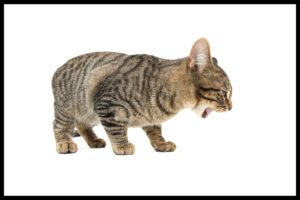Why Is My Cat Coughing? – Common Causes of Cat Coughing
 If you’re a cat owner, you’ve probably experienced the worry that comes with hearing your furry friend cough. While the occasional cough might not seem like a big deal, persistent or severe coughing could be a sign of an underlying health issue. So, why is your cat coughing? Let’s explore this common concern among cat owners.
If you’re a cat owner, you’ve probably experienced the worry that comes with hearing your furry friend cough. While the occasional cough might not seem like a big deal, persistent or severe coughing could be a sign of an underlying health issue. So, why is your cat coughing? Let’s explore this common concern among cat owners.
Common Causes of Cat Coughing
Just like humans, cats cough for a variety of reasons. Understanding these causes is essential for providing the best care for your feline companion. Some of the common causes of cats coughing include:
Allergies

Allergies are often attributed for reasons why cat sneezing and coughing take place. This is because their immune system becomes overly sensitive to foreign substances known as allergens. These allergens, such as pollen, dust, molds, and pet hair, trigger a reaction in the cat’s body. Cats might have respiratory symptoms like coughing, sneezing, or wheezing, sometimes with nasal or eye discharge. Allergies in cats manifest mostly as either skin disease or allergic bronchitis (Asthma)
Asthma
Asthma in cats is often caused by breathing in allergens. When a cat inhales these allergens, their immune system reacts, leading to inflammation and tightness or narrowing in their airways. This makes it hard for them to breathe and can cause symptoms like coughing, wheezing, and difficulty breathing.
Respiratory Infections
Respiratory infections are common in cats, particularly in densely populated environments like shelters and colonies. These infections, caused by various pathogens such as viruses, bacteria, fungi, and protozoa, significantly affect feline health, despite the effectiveness of vaccines in reducing severe respiratory diseases. Upper respiratory infections typically manifest as nasal discharge, sneezing, eye infections (conjunctivitis), mouth ulcers, lethargy, and decreased appetite, with rare cases of breathing difficulties. Lower respiratory infections secondary to these infections may result in pneumonia, coughing, lethargy, loss of appetite, and difficulty breathing.
Heartworm
Though cats are not a typical host for heartworm disease, they are still at risk for infection, especially in their adolescent years. The main symptoms of heartworm infection in cats are often vomiting, including vomiting blood, diarrhea, fast and hard breathing, coughing, and gagging. These signs can be mistaken for asthma or other lung problems. Cats might also lose their appetite, feel tired, and lose weight because of heartworm infection.
Hairballs
Hairballs are a common issue that happens when cats groom themselves. When cats lick their fur, they swallow loose hair due to the fact that their tongues have small, backward-facing bumps that help move the hair down their throat and into their stomachs. Hairballs occur because cats are ingesting an excessive amount of hair or because their gastrointestinal tract is not moving hair through the body normally.
Can a Cat Cough and Not Be Sick?
Yes, coughing can occur without a cat being sick. Cats can experience occasional coughing due to a variety of reasons that may not always indicate illness. Factors such as exposure to dust, smoke, or other allergens, the presence of a hairball, or even the cat swallowing something that irritates its throat can lead to coughing. Additionally, environmental factors such as dry air or excitement may trigger cat coughing and wheezing. However, if the coughing persists or is accompanied by other symptoms such as lethargy, lack of appetite, or difficulty breathing, it’s essential to consult your AZPetVet veterinarian to rule out any underlying health issues.
Coughing vs. Hairballs
 It’s important to understand the difference between a cough and hairballs. While coughing is a reflexive action of the respiratory system, hairballs occur when a cat ingests fur during grooming and then vomits it. Catster describes an easy way to tell the difference between a hairball and a cat cough simply by listening. While a hairball typically affects the stomach, prompting a deep “aaaackkkk” sound from the diaphragm, a cough targets the airways and lungs, resulting in a raspy, short, hoarse “hack! HACK!” noise. Observing your cat’s body movements can further aid in differentiation; retching due to a hairball typically involves smooth, repetitive contractions, whereas coughing entails a short, jerky shaking motion that engages the entire body. A coughing cat tends to exhibit tense muscles, whereas a cat retching is more likely to display undulating movements as the stomach contracts.
It’s important to understand the difference between a cough and hairballs. While coughing is a reflexive action of the respiratory system, hairballs occur when a cat ingests fur during grooming and then vomits it. Catster describes an easy way to tell the difference between a hairball and a cat cough simply by listening. While a hairball typically affects the stomach, prompting a deep “aaaackkkk” sound from the diaphragm, a cough targets the airways and lungs, resulting in a raspy, short, hoarse “hack! HACK!” noise. Observing your cat’s body movements can further aid in differentiation; retching due to a hairball typically involves smooth, repetitive contractions, whereas coughing entails a short, jerky shaking motion that engages the entire body. A coughing cat tends to exhibit tense muscles, whereas a cat retching is more likely to display undulating movements as the stomach contracts.
Can Cats Get Kennel Cough?
Yes, cats can contract kennel cough, also known as infectious tracheobronchitis. Although commonly associated with dogs, this highly contagious respiratory infection can affect cats, especially those in close quarters with infected animals. Kennel cough in cats is described as a dry, raspy, repetitive cough. Thankfully, kennel cough in cats tend to be generally mild, though it can still cause discomfort. The good news is that it typically improves with proper veterinary care.
Nevertheless, in more severe instances, kennel cough can develop into pneumonia and pose a risk of fatality. Kittens, senior cats, and those with weakened immune systems or specific underlying health issues are particularly vulnerable.
What To Do If Your Cat Is Coughing
If your cat is coughing, it is important to assess if there are immediate signs of distress and check for environmental triggers. Try your best to monitor the frequency and severity of the cough, noting any accompanying symptoms. If the cough persists for more than a day or is severe, consult your AZPetVet veterinarian promptly. They can diagnose the underlying cause and recommend appropriate treatment. Early intervention is key to alleviating discomfort and preventing potential complications.
Will Cat Coughing Heal Itself?
While mild cat coughing may resolve on its own, persistent or severe coughing requires veterinary attention. We recommend receiving a professional evaluation from one of our experienced veterinarians to determine the best treatment options that can help address the underlying cause and alleviate your cat’s symptoms.
Treatments For Cat Coughing
Treatment for cat coughing varies depending on the underlying cause. For mild cases, using decongestant medications may offer symptomatic relief. However, if the underlying cause is determined to be infectious, antibiotics are typically prescribed to help with a faster recovery. It’s common for antibiotics to be administered for a duration of at least two weeks, sometimes longer, to ensure the infection is fully out of your cat’s system. It’s important to strictly follow the prescribed medication duration and frequency, even if your cat appears to improve before completing the course. Stopping the treatment early can lead to the resurgence of the infection, potentially making it more challenging to manage. Therefore, completing the full course of medication is essential for your cat’s well-being and to prevent recurrence of the infection. Chronic coughing is often treated with inhalers as well. These inhalers may need to be given for life with chronic conditions
How to Know If a Cat Cough Is Serious
An occasional dry, non-productive cough is not a cause for concern, but persistent coughing is concerning and even more so if it is accompanied by the production of phlegm or sputum. Additionally, if your cat shows signs of illness such as weight loss or lethargy, it’s recommended that you schedule an appointment at your nearest AZPetVet location. This ensures any underlying issues are addressed promptly and your cat receives appropriate care.
Request an Appointment Today
If your cat is experiencing persistent or severe coughing, coughing up blood, open mouth breathing, exaggerated breathing, difficulty breathing, trouble catching breath, or other concerning symptoms, it’s important to schedule an appointment with your nearest AZPetVet location promptly, one of our experienced veterinarians will be able to provide you with the best course of action. Early intervention can help prevent complications and ensure your cat receives the care they need.
As responsible pet owners, it’s our duty to monitor our cats’ health closely and seek veterinary attention when necessary. By staying informed and proactive, we can provide the best possible care for our beloved feline companions.

